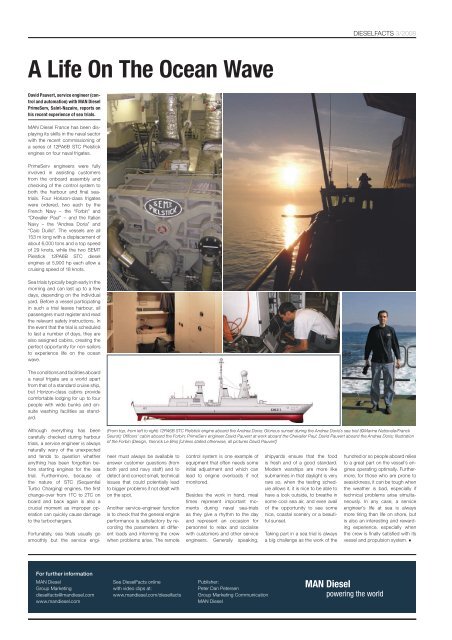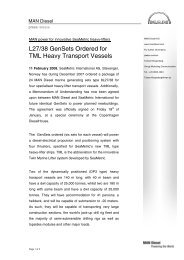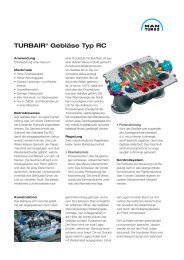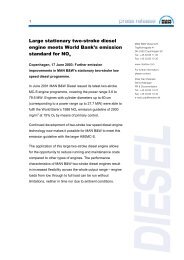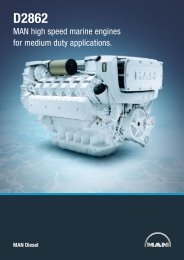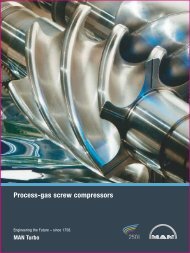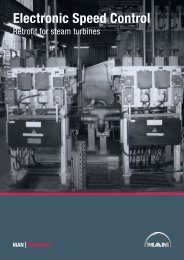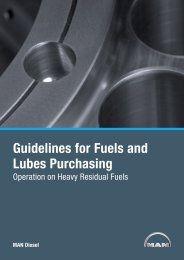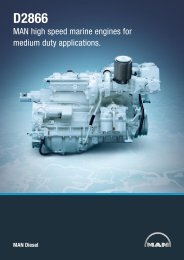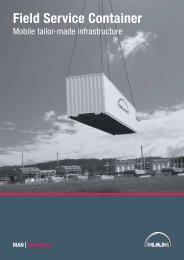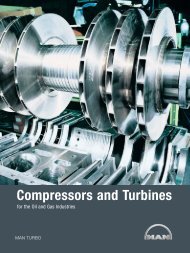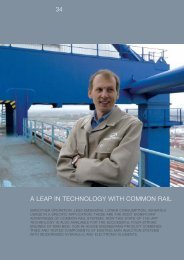DF_2008_3 pdf (3.7MB) - MAN Diesel & Turbo SE
DF_2008_3 pdf (3.7MB) - MAN Diesel & Turbo SE
DF_2008_3 pdf (3.7MB) - MAN Diesel & Turbo SE
- No tags were found...
You also want an ePaper? Increase the reach of your titles
YUMPU automatically turns print PDFs into web optimized ePapers that Google loves.
DIE<strong>SE</strong>LFACTS 3/<strong>2008</strong>A Life On The Ocean WaveDavid Pauvert, service engineer (controland automation) with <strong>MAN</strong> <strong>Diesel</strong>PrimeServ, Saint-Nazaire, reports onhis recent experience of sea trials.<strong>MAN</strong> <strong>Diesel</strong> France has been displayingits skills in the naval sectorwith the recent commissioning ofa series of 12PA6B STC Pielstickengines on four naval frigates.PrimeServ engineers were fullyinvolved in assisting customersfrom the onboard assembly andchecking of the control system toboth the harbour and final seatrials.Four Horizon-class frigateswere ordered, two each by theFrench Navy – the “Forbin” and“Chevalier Paul” – and the ItalianNavy – the “Andrea Doria” and“Caio Duilio”. The vessels are all153 m long with a displacement ofabout 6,000 tons and a top speedof 29 knots, while the two <strong>SE</strong>MTPielstick 12PA6B STC dieselengines at 5,900 hp each allow acruising speed of 18 knots.Sea trials typically begin early in themorning and can last up to a fewdays, depending on the individualyard. Before a vessel participatingin such a trial leaves harbour, allpassengers must register and readthe relevant safety instructions. Inthe event that the trial is scheduledto last a number of days, they arealso assigned cabins, creating theperfect opportunity for non-sailorsto experience life on the oceanwave.The conditions and facilities aboarda naval frigate are a world apartfrom that of a standard cruise ship,but Horizon-class cabins providecomfortable lodging for up to fourpeople with wide bunks and ensuitewashing facilities as standard.Although everything has beencarefully checked during harbourtrials, a service engineer is alwaysnaturally wary of the unexpectedand tends to question whetheranything has been forgotten beforestarting engines for the seatrial. Furthermore, because ofthe nature of STC (Sequential<strong>Turbo</strong> Charging) engines, the firstchange-over from 1TC to 2TC onboard and back again is also acrucial moment as improper operationcan quickly cause damageto the turbochargers.(From top, from left to right) 12PA6B STC Pielstick engine aboard the Andrea Doria; Glorious sunset during the Andrea Doria’s sea trial (©Marine Nationale/FranckSeurot); Officers’ cabin aboard the Forbin; PrimeServ engineer David Pauvert at work aboard the Chevalier Paul; David Pauvert aboard the Andrea Doria; Illustrationof the Forbin (Design, Yannick Le Bris) [Unless stated otherwise, all pictures David Pauvert]Fortunately, sea trials usually gosmoothly but the service engineermust always be available toanswer customer questions (fromboth yard and navy staff) and todetect and correct small, technicalissues that could potentially leadto bigger problems if not dealt withon the spot.Another service-engineer functionis to check that the general engineperformance is satisfactory by recordingthe parameters at differentloads and informing the crewwhen problems arise. The remotecontrol system is one example ofequipment that often needs someinitial adjustment and which canlead to engine overloads if notmonitored.Besides the work in hand, mealtimes represent important momentsduring naval sea-trialsas they give a rhythm to the dayand represent an occasion forpersonnel to relax and socialisewith customers and other serviceengineers. Generally speaking,shipyards ensure that the foodis fresh and of a good standard.Modern warships are more likesubmarines in that daylight is veryrare so, when the testing scheduleallows it, it is nice to be able tohave a look outside, to breathe insome cool sea air, and even availof the opportunity to see somenice, coastal scenery or a beautifulsunset.Taking part in a sea trial is alwaysa big challenge as the work of thehundred or so people aboard reliesto a great part on the vessel’s enginesoperating optimally. Furthermore,for those who are prone toseasickness, it can be tough whenthe weather is bad, especially iftechnical problems arise simultaneously.In any case, a serviceengineer’s life at sea is alwaysmore tiring than life on shore, butis also an interesting and rewardingexperience, especially whenthe crew is finally satisfied with itsvessel and propulsion system.For further information<strong>MAN</strong> <strong>Diesel</strong>Group Marketingdieselfacts@mandiesel.comwww.mandiesel.comSee <strong>Diesel</strong>Facts onlinewith video clips at:www.mandiesel.com/dieselfactsPublisher:Peter Dan PetersenGroup Marketing Communication<strong>MAN</strong> <strong>Diesel</strong>


